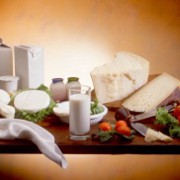Calcium in the bones helps prevents osteoporosis; calcium in the urine contributes to kidney stones. I'm concerned about my own calcium consumption because I'm lactose intolerant, so I don't drink milk. I do take calcium supplements. Is it possible to overdo it, and get too much calcium?
The mayoclinic.com web site says too much calcium in the bloodstream causes obvious symptoms such as nausea and vomiting. But the kidneys can handle a mild overdose of calcium; they excrete the excess in the urine. This raises a concern about kidney stones. Most of them are composed of calcium oxalate or calcium phosphate.
So if I consume too much calcium, will I get kidney stones? The answer from the medical literature surprised me. In a study of men under the age of 60, the risk of kidney stones decreased with increasing calcium in the diet. This is backwards from what we would expect, and the authors of the paper have no explanation. For men over age 60, the amount of calcium in the diet had no effect on formation of kidney stones. I have not yet found comparable data for women. The main risk for kidney stones in women appears to be weight. See https://www.empowher.com/news/herarticle/2009/08/10/women-weight-and-kidney-stones.
Researchers at the University of California report that potassium and bicarbonate ions tend to keep calcium in the bones, while sodium and chloride ions tend to increase calcium in the urine and promote the formation of kidney stones. Bicarbonate ions are formed from the metabolism of organic compounds, mainly citrate, found in fruits and vegetables. Potassium is also abundant in fruits and vegetables (but not grains).
According to these researchers, both potassium and bicarbonate have a positive effect on the kidney's ability to regulate calcium excretion. Bicarbonate also prevents calcium loss from the bones by balancing the pH (a measure of acidity or alkalinity) of the blood and tissue fluids. Too much sodium, on the other hand, interferes with the kidney's regulation of calcium.
So I'm continuing the calcium supplements and eating plenty of vegetables.
by Linda Fugate, Ph.D.
References:
1. Taylor EN, Stampfer MJ, Curhan GC, “Dietary factors and the risk of incident kidney stones in men: new insights after 14 years of follow-up”, J Am Soc Nephrol 2004; 15:3225-3232.
2. Morris RC, Schmidlin O, Frassetto LA, Sebastian A. “Relationship and interaction between sodium and potassium”, Journal of the American College of Nutrition, 2006; 25(3), 262S-270S.






Add a CommentComments
There are no comments yet. Be the first one and get the conversation started!